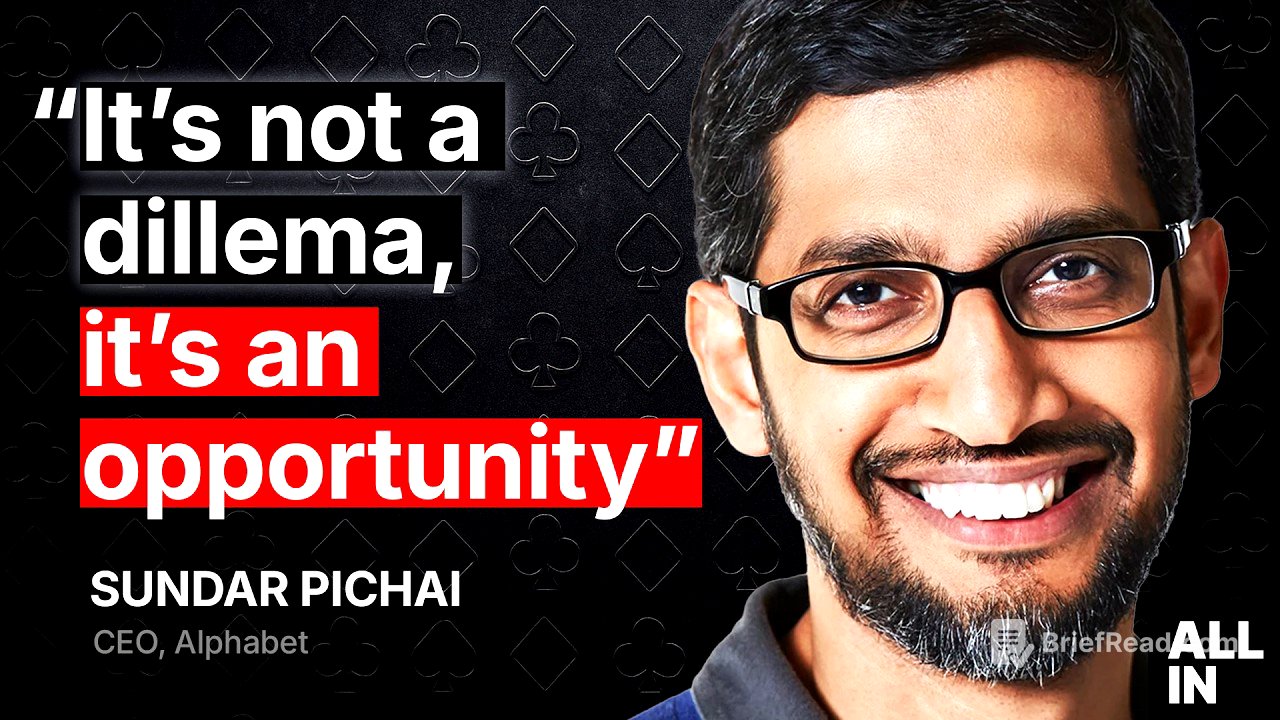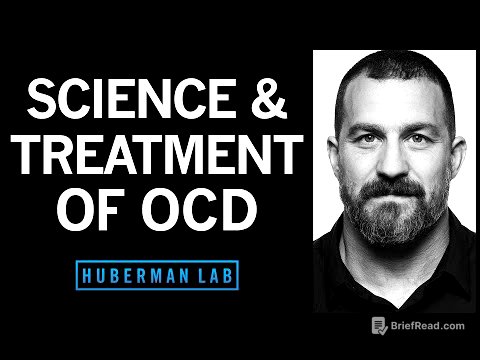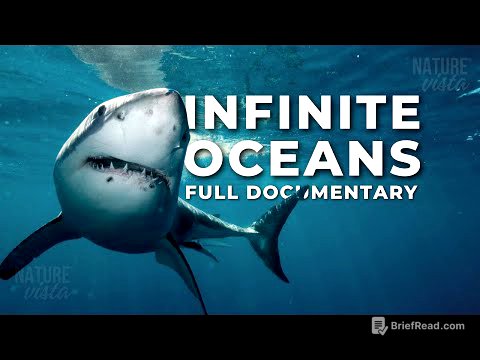TLDR;
This conversation with Sundar Pichai, CEO of Alphabet, explores Google's strategy in the age of AI, addressing disruption, competition, and future innovations. Pichai highlights Google's AI-first approach, infrastructure advantages, and investments in areas like quantum computing and robotics. He also touches upon the importance of talent, culture, and the evolving landscape of education.
- Google views AI as an opportunity, not a dilemma, and is integrating it deeply into search and other products.
- Google's infrastructure, including TPUs, provides a cost and performance advantage in AI.
- Quantum computing and robotics are key areas of long-term investment and innovation for Google.
Intro [0:02]
The All-In Podcast hosts discuss their excitement for the interview with Sundar Pichai, CEO of Alphabet. They acknowledge Pichai's impressive tenure and the company's growth under his leadership, highlighting the pivotal moment Google is facing with the rise of AI.
Google and the Innovator's Dilemma [2:15]
The conversation starts with the question of whether Google is at risk of being disrupted by AI. Pichai responds by saying that Google has been focused on AI for almost a decade, viewing it as a major driver of progress in search. He mentions the launch of AI overviews, which are used by over 1.5 billion users in 150 countries, and the upcoming AI mode in search, which will allow for more conversational queries. Pichai believes that Google's focus on user experience and innovation will allow it to thrive in the age of AI, just as it did with mobile and other technological shifts. He emphasises that Google's principle is to follow the user, and all else will follow.
Gemini App and the Competitive Landscape [8:11]
The discussion moves to the Gemini app and its competition with other AI platforms like ChatGPT and Meta AI. Pichai acknowledges ChatGPT's success but notes that it's still early days and Google is seeing traction and growth with Gemini, especially with the introduction of Gemini 2.5 Pro. He highlights recent updates to the app, including deep research, updated canvas, and video generation capabilities. Pichai stresses that Google's focus is on innovating and ensuring that users are responding positively to its products.
Unit Economics of AI-Powered Search [10:37]
The conversation shifts to the unit economics of Google's business, specifically the cost of serving an AI-driven search query versus a traditional search query. Pichai says that the cost to serve a query has fallen dramatically in the last 18 months due to Google's infrastructure and technology. He adds that the primary constraint is latency, not cost, and that Google is working to ensure that AI-powered search is as fast as traditional search. Pichai also says that ad revenue per AI query is already at the baseline of traditional search and has the potential to improve over time.
Managing Transition and Execution [12:58]
Pichai addresses the pressure from Wall Street and the board to manage the transition to AI while maintaining revenue and profitability. He says that his focus is on execution, moving fast, and innovating. Pichai highlights the success of YouTube and Google Cloud as robust businesses and emphasises that AI is a cross-cutting technology that can impact all aspects of Google's business. He expresses excitement about the opportunities ahead and believes that Google is well-positioned for the future.
Google's Infrastructure Advantage [15:33]
Pichai discusses Google's infrastructure advantage, which he says is a core and often misunderstood aspect of the company. He explains that Google is on the parto frontier of performance and cost, delivering the best models at the most cost-effective price point. This is due in part to Google's TPUs, which are now in their seventh generation. Pichai says that Google's full-stack approach, from subsea cables to fundamental R&D, allows it to drive down infrastructure costs and offer attractive value to customers.
Chips and the Competitive Landscape [19:44]
The conversation moves to chips and Google's relationship with Nvidia. Pichai acknowledges Nvidia as a phenomenal company and says that Google uses both Nvidia GPUs and its own TPUs for training and serving AI models. He says that Google is committed to the TPU direction but also values the flexibility of using both types of chips. Pichai believes that the competition between Google and Nvidia pushes both companies to drive the frontier forward.
The Future of LLMs and Data Advantage [21:24]
Pichai addresses the narrative that performance in foundational LLMs is plateauing. He says that progress may not always be smooth but that there is still a lot of opportunity to evolve LLMs. Pichai highlights Google's broader research efforts beyond LLMs, including diffusion models and world models. He also discusses Google's data advantage with products like YouTube, Gmail, and Calendar, which allows it to create much better experiences for people with their permission.
Future of Human-Computer Interaction [25:09]
Pichai shares his vision for the future of human-computer interaction, saying that computing should adapt to humans, not the other way around. He envisions a future where technology is more seamless and ambiently present, doing things for users without requiring as much effort. Pichai expresses excitement about the potential of AR glasses to create a more seamless and immersive experience. He confirms that Google is spending a lot of time on hardware, including AR glasses, robotics, and Pixel phones.
Founders' Engagement and Competitive Landscape [28:17]
Pichai discusses the engagement of Google's founders, Larry Page and Sergey Brin, in the company's AI efforts. He says that both founders are deeply involved and excited about the potential of AI. Sergey is actively spending time with the Gemini team, coding and giving feedback on model architectures. Pichai also shares his perspectives on Google's competitors, including OpenAI, XAI, Meta, and Microsoft, acknowledging their impressive leaders and companies. He emphasises that the AI landscape is vast and that there will be many winners, not just one.
Deepseek and China's AI Capabilities [33:37]
The conversation turns to Deepseek, a Chinese AI model, and China's overall AI capabilities. Pichai says that the Deepseek moment was a reminder that China is closer to the AI frontier than many people assume. He notes that China has extraordinary talent and a significant research output. Pichai says that Google benchmarked Deepseek to its own Flash model and found them to be comparable. He believes that China will be very competitive in the AI space.
Electricity and AI Growth [35:33]
Pichai addresses the role of electricity generation in AI growth, acknowledging that it is a key constraint. He says that the technologies to supply the demand are already known, so it's more of an execution challenge. Pichai suggests embracing all possible innovations in the energy sector, including solar, nuclear, and geothermal. He also mentions the need to upgrade the grid, solve for transmission, and address workforce shortages in the electricity sector. Pichai admits that Google is currently supply-constrained in its cloud business due to electricity constraints.
Quantum Computing [40:49]
Pichai discusses Google's long-term investment in quantum computing, which he says is often ignored or misunderstood. He explains that the universe is fundamentally quantum and that quantum computing will be necessary for large-scale simulations. Pichai believes that quantum computing is where AI was in 2015 and that there will be a moment in the next 5 years where a useful practical computation is done in a quantum way, far superior to classical computers. He says that Google is at the frontier of quantum computing and is excited about its potential.
Robotics and Physical AI [45:16]
The conversation moves to robotics and physical AI. Pichai says that Google has one of the most advanced R&D teams in the world in this area and is building state-of-the-art models for robotics. He says that Google is thinking through how to partner or bring products out in the robotics space. Pichai believes that the combination of AI and robotics is creating a new sweet spot and that Google is probably two to three years away from a magical moment in robotics. He suggests that Google could potentially develop the Android for robotics.
Culture and Talent [47:59]
Pichai discusses Google's culture and its evolution over the years. He says that the underpinnings of Google's culture are investing in employees, empowering them, and creating a positive and optimistic environment. Pichai acknowledges that there have been moments where the focus shifted away from the mission of the company and that he has been working to bring that focus back. He says that Google is still able to attract top talent and is also seeing extraordinary talent emerging in other parts of the world.
Alphabet as a Holding Company [56:54]
Pichai addresses the question of whether Alphabet is still thought of as a holding company. He says that Alphabet is not just looking to invest capital in other attractive businesses but is focused on using its foundational technology and R&D to innovate and bring differentiated value propositions. Pichai explains that the structure of Alphabet is an outcome of this approach and that there is a common strand of technology and innovation that underlies all of its businesses. He confirms that X still plays a big role in driving innovation within Alphabet.
Biggest Regret and Proudest Achievement [1:00:11]
As the interview concludes, Pichai is asked about his biggest regret and proudest achievement as CEO. He says that he is most proud of Google's ability to push the technology frontier and apply it to create businesses and value. Pichai mentions that there are acquisitions that Google debated hard but didn't pursue, such as Netflix. He concludes by thanking the interviewer and acknowledging the important role that Alphabet plays in driving innovation and prosperity.









